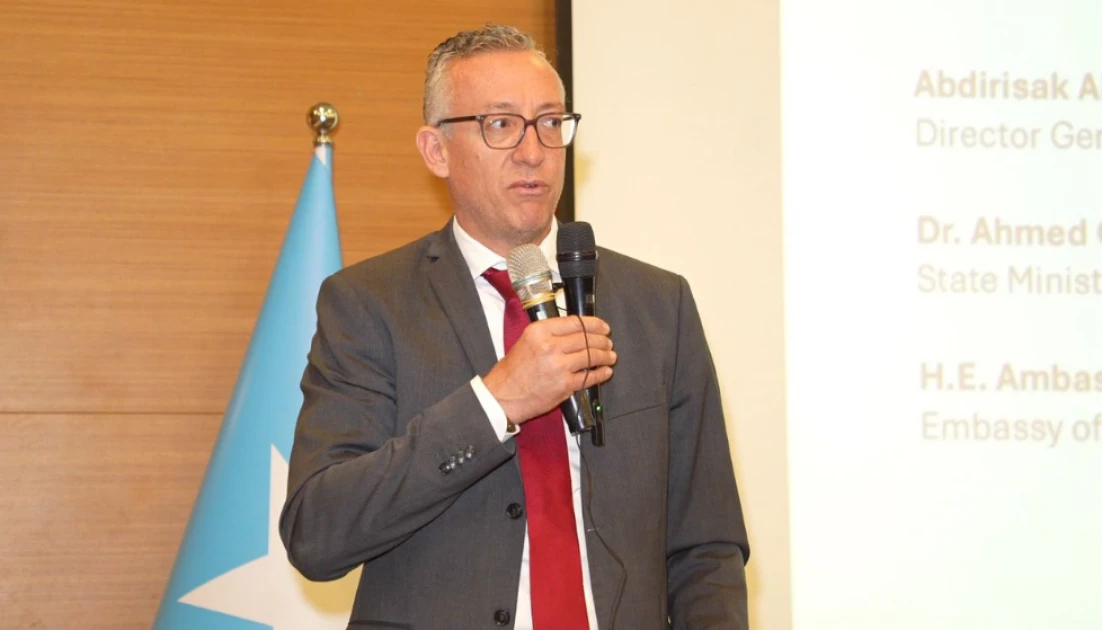Mogadishu hosts first-ever climate talk linking peace and environmental action

Sebastian Groth, German Ambassador to Somalia and Kenya. [Photo / Courtesy]

Audio By Vocalize
In a city long associated with conflict and instability, Mogadishu this past week staged a different kind of gathering—one that sought to connect climate action with peacebuilding.
The Somali capital hosted the inaugural Mogadishu Climate Talk,
a forum organized by the German Embassy in Somalia in collaboration with the
Somali Ministry of Environment and Climate Change and the Berghof Foundation.
The event brought together policymakers, civil society
representatives, and international partners to discuss how climate change is
shaping Somalia’s security and stability.
“This is not just a climate conference—it is a peace
dialogue,” German Ambassador Sebastian Groth said in his opening remarks.
“And it is vital that we hold this conversation here, in
Mogadishu, where the impacts of climate change are not abstract projections,
but daily realities.”
Unlike previous international forums often held in regional
hubs like Nairobi or Addis Ababa, the decision to convene the talks in
Mogadishu was deliberate.
Organizers said it was meant to root the discussion in Somali
realities and elevate local voices in global climate discourse.
Although Somalia contributes minimally to global greenhouse
gas emissions, it is among the most climate-vulnerable nations.
With more than 80 percent of its population relying on
agriculture and pastoralism, the country faces frequent droughts, floods, and
rising temperatures that threaten livelihoods and deepen instability.
“Climate change in Somalia is a threat multiplier,” Ambassador
Groth stressed. “It deepens existing vulnerabilities, fuels displacement, and
strains already scarce natural resources. But it also provides a unique
opportunity to build resilience through cooperation.”
Panel discussions examined how environmental pressures
intersect with land disputes, migration, and long-standing socio-political
tensions.
Participants underscored that climate adaptation measures
could also serve as tools for peacebuilding and strengthening institutional
trust.
Somalia has taken steps to strengthen climate governance,
including the rollout of its updated Nationally Determined Contributions (NDC
3.0), a national adaptation plan, and enhanced access to the Green Climate
Fund.
“These are no small achievements in a complex environment,”
Groth said. “They reflect the determination of Somali institutions and the
growing recognition that the climate crisis must be met with serious, sustained
action.”
He added that environmental policy has become “a rare space
for constructive collaboration across Somalia’s federal and regional
institutions—an encouraging sign in a politically fragmented landscape.”
The Berghof Foundation, which has a long track record in
peacebuilding initiatives across Somalia, facilitated the forum with an
emphasis on inclusive dialogue.
Women, youth, and community leaders were central to the
discussions, bringing lived experiences to the table.
“Peacebuilding and climate resilience must go hand in hand,”
one youth representative said. “Our communities are ready to lead—we just need
the tools and trust to do so.”
The talks also tied Somali perspectives to global priorities
ahead of the COP30 summit in Brazil, highlighting how grassroots experiences
can inform international climate action.
For many participants, the Mogadishu Climate Talk was both
symbolic and practical—a beginning rather than an end.
“It is our hope that this is the beginning of a sustained
dialogue,” Ambassador Groth said in his closing remarks.
“One that continues to bridge the climate-peace divide and
places Somalia not only as a recipient of global support, but as a contributor
to global solutions.”
As the gathering concluded, organizers said the event
reflected Mogadishu’s resilience and its determination to shape a more
sustainable and peaceful future—one where climate action and peacebuilding
advance hand in hand.


Leave a Comment